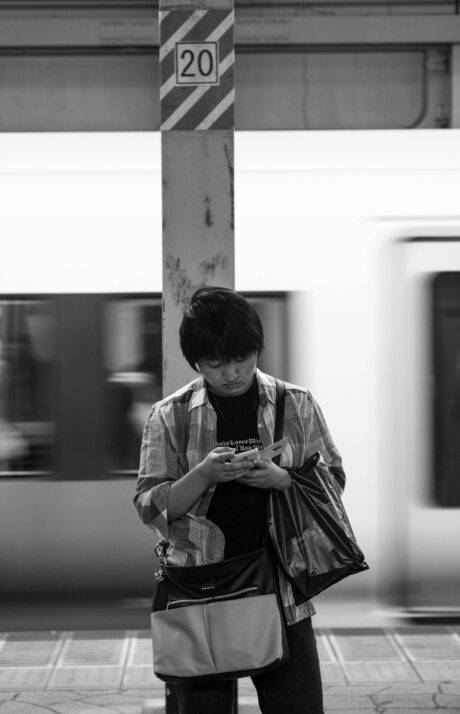FOMO, or “fear of missing out,” afflicts many of us more dramatically in our hyper-connected world than it did in the past. Thanks to constant connectivity, we are immediately aware of what all of our family, friends, loved ones, classmates, co-workers, and neighbors are up to–often in real-time. As we scroll through our feeds, we experience pangs of jealousy, attachment, resentment, self-pity, or self-criticism in a quickly cascading rush of emotion.

Although FOMO is nothing new, now that we have access to everyone else’s carefully curated happiness, we feel its sting more intensively. And younger people tend to suffer more consistently. Scientists have found that we tend to experience higher rates of FOMO as the day winds to a close. Similarly, the feeling intensifies as we approach the weekend. We suspect, or we have direct “evidence” from social media, that other people are having better experiences than we are.
And those of us who feel stuck in work that doesn’t inspire us, or in the study that is not a passionate interest feel this most intensively. Even when researchers looked at different personality types, they found that FOMO occurs without distinction.
While we know we don’t like this feeling, we seem caught in a web that perpetuates comparison and judging. We judge others, and ourselves. And to make matters worse, then we judge ourselves for judging! Besides the icky emotional side, FOMO contributes to both physical and mental health issues. We become distracted and can’t focus on our own current situation, regardless of how enjoyable that might be. Or we may become depressed if we see evidence that others are enjoying themselves in a “better” way or “cooler” place. We make ourselves anxious because we’re always peeking to see if we’re missing something.
FOMO Affects Others Around You


Moreover, FOMO damages our personal relationships in subtle ways that we are just beginning to understand. Think about how it feels when your loved one or friend is scrolling through a device while you try to have a meaningful conversation. And how many times have you done the same thing to another person because you just had to check in to see what was new with others? We say we feel lonely and are looking to connect with others, but often we ignore those who are immediately present.
Logically, we know that we can’t be everywhere and doing everything. But FOMO can drive us to stop making any plans or commitments because we’re waiting for something (or someone) better to come along. And then, naturally, because we’ve procrastinated, we end up frustrated when we see others having the experience we could easily have enjoyed.
So, how do we get out of this cycle? Well, many people advise us to go on social media diets and reduce our device usage. And of course that can be very helpful–especially late in the evenings or on weekends! But for many people that may seem impossible.
Ancient Buddhist Tool to Deflate FOMO
Instead, we can adopt an ancient tool from the Buddhist tradition to approach this modern problem. And it is not just applying mindfulness! Certainly it can be helpful to be aware and notice as soon as possible when we begin to experience FOMO. But that noticing is not sufficient. In addition, we can begin to actively reshape our experience. We can learn to practice “sympathetic joy” or “gladness”–translated from the Pali and Sanskrit term muditā. And like mindfulness, we don’t need to have any particular spiritual beliefs in order to benefit from this practice. So, what does this sympathetic joy or gladness involve?
Practicing Sympathetic Joy or Gladness
Classic texts use the example of a parent feeling delighted seeing the happiness of a child. Commentators encourage us to think of a close friend–and these days we can easily see the activities of those we love. When we see a social media post by a person dear to us, we can start by thinking, “How wonderful! They are happy–that is so nice!” We can actively cultivate a sense of delight. Let that feeling of gladness arise deep within you and wish that person well–“may they continue to have happiness.” See if you can resist automatically continuing to scroll through your feed and instead, spend a few minutes really allowing that joy to spread.
You may think to yourself, “that’s not so hard–I already do that.” But when we practice sympathetic joy, we do so without any wistful or subtle jealousy attached. So as we train in this way, we use mindfulness to check ourselves. Can we see our friends enjoying life and feel genuine delight, without a twinge of envy or resentment? And can we see this without looking at our own situation and feeling unhappy or dissatisfied. If so, fantastic! Then your engagement with social media is probably benign.
But if not–if FOMO raises its head, then observe that without judging. Then make a real effort to think, “may this person enjoy happiness. How wonderful that they are having this experience!” Allow yourself the time to let that thought grow and resonate.
Starting Small
In the beginning, this practice may seem a little forced, but remember that we are training our minds to experience things differently. It is also okay to feel like we may be saying something we don’t really feel. We’re forming new habits–and that does take some time, and some effort. We are accustoming ourselves to a way of thinking that is not fueled by competitiveness–and that’s a new experience for many of us. Instead of feeling depressed, anxious, or insecure when somebody we like seems to be having an experience we are missing, we wish them well–we wish them even more joy.
FOMO Antidote: Widening the Joy
Once you’re able to easily give rise to joy when seeing the happiness of those we like or love–then we can begin to widen the net. And note that for some people this element might be even easier because they may feel less pressure with strangers!
So now, whenever we see people enjoying themselves or having positive experiences–regardless of whether we know them or not–we simply extend this same thought: “How wonderful they are happy–may they continue to be joyful!” As we work with these thoughts, our relationships with social media, as well as our direct personal interactions, can begin to shift. When we see strangers enjoying experiences, we can practice feeling happy.
Joy for All
Now, after we’ve practiced for a period of time with friends and neutral people, we can go even deeper. For most people this can be more difficult, so don’t rush the process. Now, we’re going to take this same attitude and extend it to those we don’t like. Can you be happy when your irritating co-worker posts vacation photos from a place you’ve wanted to visit? Or when the annoying neighbor posts his dinner at a cool new spot? And do you feel resentful when a person you dislike or disrespect seems to be having everything go their way?
Again, start small. Don’t worry if it doesn’t feel sincere in the beginning. But if you start to feel happy for that co-worker, then maybe you’ll not feel sorry for yourself for not being on vacation. Instead, you might be able to have a meaningful conversation with him when he returns and start to make your own plans to travel. And when you can sincerely begin to think, “oh, that’s really nice” when someone has a good experience, then you’ll feel your fears disappear. You may have missed that experience, but you’ve gained something much more powerful.
Shift in Perspective
This shift in perspective, from our own discomfort to appreciation for others’ happiness, makes a profound change in us. Instead of giving into FOMO and feeling anxious, competitive, and judgmental, we begin to appreciate small joys. We may find that we generally feel more joyful because we notice and rejoice in others’ happiness. By focusing on others instead of wishing we were in their place, we can begin to relax. And once we relax, we may naturally enjoy our own situation right where we are.
Note: This advice is not meant to take the place of mental health professional guidance. Mental conditions are complex and people differ widely in their conditions and responses. If you suffer from serious anxiety or depression, we suggest that you seek the services of a trained mental health professional.
Samye Instructor










Responses